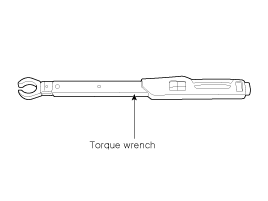Disconnect the control wiring connectors and harness clamps, and remove the wiring protector around the intake manifold.
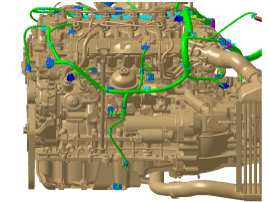
Common Rail Fuel Injection System operates at extremely high pressure (approximately 2,000 bar), so do not perform any work on injection system with engine running or within 30 seconds after the engine stops.
Keep the components of common rail system and the working are clean.
Avoid influx of foreign substances when installing the fuel supply system.
Remove the protecting cap from injector, tube or hose just before installing it to prevent the influx of foreign substances.
Do not remove injector except in special case.
When installing the injector
- Clean the contacting area of the injector and replace the gasket with a new one.
- Vertically insert the injector into the cylinder head to prevent the damage caused by shock.
- Clean the surface under the injector gasket of the cylinder head before installing the injector.
When installing High Pressure Fuel Pipe
- Install the flange nut correctly.
- Do not reuse high pressure fuel pipe. Always use a new one.
When removing / installing the injector return line
- Insert the connector only in unlocked status.
- Insert the connector by hand. Do not use a tool
Turn ignition switch OFF and disconnect the battery negative (-) battery terminal.
Disconnect the control wiring connectors and harness clamps, and remove the wiring protector around the intake manifold.

Remove the oil level gauge & guide.
(Refer to Engine Mechanical System - "Oil Level Gauge & Pipe")
Disconnect the fuel return line (A).
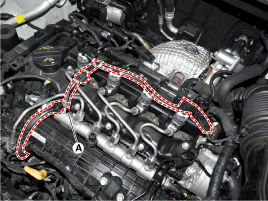
Remove the high pressure fuel pipe flange nut (A) after loosening the clamp mounting bolt (B).
High pressure fuel pipe clamp mounting bolt:
6.8 ~ 10.7 N.m (0.7 ~ 1.1 kgf.m, 5.1 ~ 8.0 lb-ft)
High pressure fuel pipe flange nut:
24.5 ~ 28.4 N.m (2.5 ~ 2.9 kgf.m, 18.1 ~ 21.0 lb-ft)
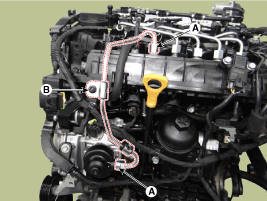
Remove the low pressure fuel feed & return line bracket (B) after loosening the mounting bolt (A).
Low pressure fuel feed & return line bracket mounting bolt :
6.8 ~ 10.7 N.m (0.7 ~ 1.1 kgf.m, 5.1 ~ 8.0 lb-ft)
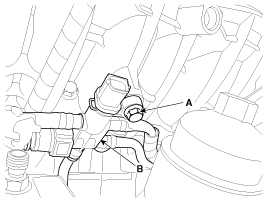
Disconnect the fuel pressure control valve connector (A), fuel feed tube quick-connector (B) and fuel return tube quick-connector ( C).
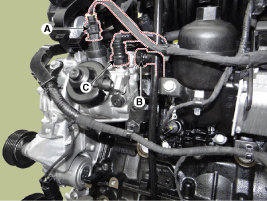
Remove the intake manifold.
(Refer to Engine Mechanical System - "Intake Manifold")
Lift the vehicle.
Remove the engine room under cover (A).
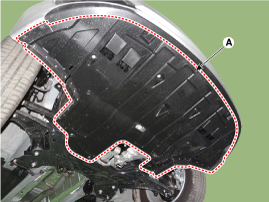
Remove the drive belt.
(Refer to Engine Mechanical System - "Drive Belt")
Remove the starter.
(Refer to Engine Electrical System - "Starter" )
Turn the crankshaft pulley, and align its groove with timing mark "T" of the timing chain cover (No.1 cylinder compression in TDC position).
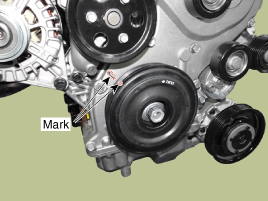
Install the fixing flywheel stopper [SST No: 09231-2B100] on the flywheel.
Lift the RH side of the engine on a jack (A).
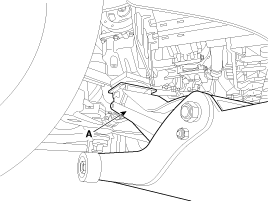
Disconnect the ground line (A).

Remove the engine mounting support bracket (A).
Tightening torque :
49.0 ~ 63.7N.m (5.0 ~ 6.5kgf.m, 36.2 ~ 47.0lb-ft)
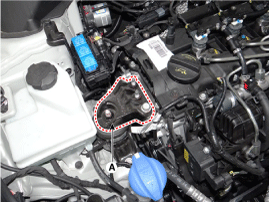
Remove the idler (B) using a wrench (A).
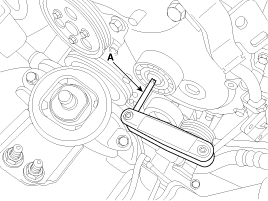
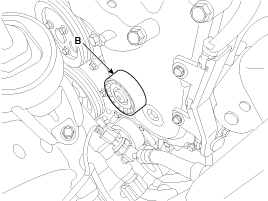
Remove the timing chain cover plug (B) using a wrench (A).
Timing chain cover plug :
25.5 ~ 34.3 N.m (2.6 ~ 3.5 kgf.m, 18.8 ~ 25.3 lb-ft)
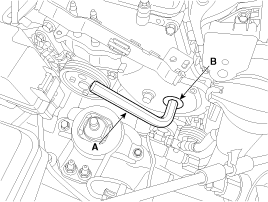
Remove the high pressure fuel pump sprocket nut (A).
High pressure fuel pump sprocket nut:
64.7 ~ 74.5 N.m (6.6 ~ 7.6 kgf.m, 47.7 ~ 55.0 lb-ft)
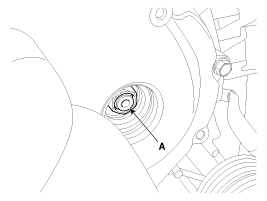
Remove the timing chain cover mounting bolts (A).
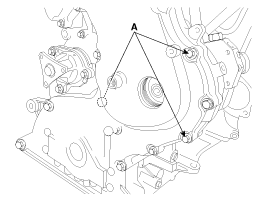
Fix the high pressure fuel pump remover and stopper (A) [SST No.: 09331-2A010] after lifting the RH side of the engine on a jack.
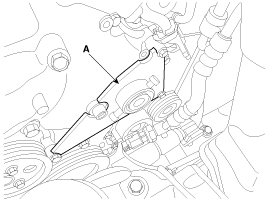
Remove the high pressure fuel pump mounting bolts (A).
High fuel pump mounting bolt:
19.6 ~ 25.5 N.m (2.0 ~ 2.6 kgf.m, 14.5 ~ 18.8 lb-ft)
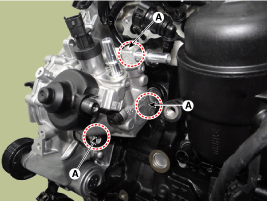
Install the high pressure fuel pump mounting bolt (A) [SST No.: 09331-2A010]
Rotate the bolt (A) of the high pressure fuel pump remover [SST No.:09331-2A010] clockwise until the high pressure fuel pump pops out.
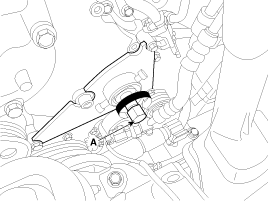
Remove the high pressure fuel pump (A).
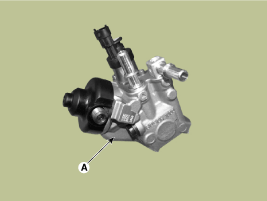
Install in the reverse order of removal.
When installing the high pressure fuel pipe, tighten to the specified tightening torques by using the special service tool (SST No.:09314-27120).
After removing or replacing the following parts, bleed air in low pressure fuel circuit.
(Refer to Fuel Delivery System - "Air bleeding in low pressure fuel circuit")
Fuel Tank
Low Pressure Fuel Pump
Fuel Pump Motor
Fuel Sender
Fuel Filter
Fuel Heater
Water Sensor
Fuel Line
High Pressure Fuel Pump
Common Rail
After removing or replacing the following fuel systems, the fuel leakage test procedure must be performed. (Refer to "Fuel leak test" in this group.)
Fuel Tank
Low Pressure Fuel Pump
Fuel Pump Motor
Fuel Sender
Fuel Filter
Fuel Heater
Water Sensor
Fuel Line
High Pressure Fuel Pump
Common Rail
If it is difficult to use the special service tools 09314-27110 or 09314-27120 for tightening some of the high pressure fuel pipe flange nuts to the specified torque, a spanner torque wrench shown below an also be used.
